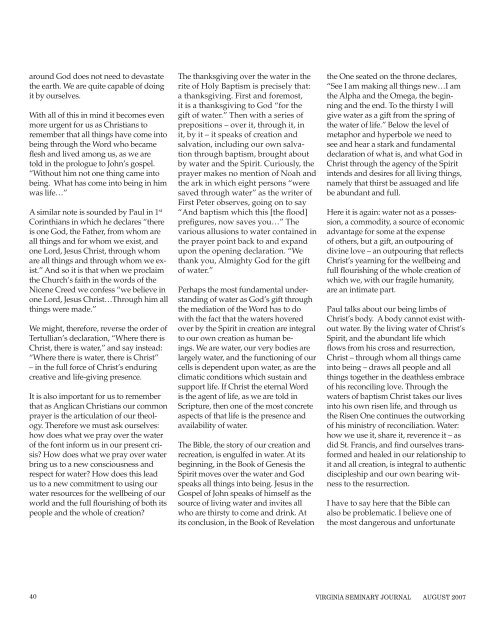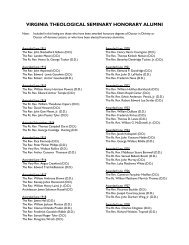Seminary Journal 2008 (August) - Virginia Theological Seminary
Seminary Journal 2008 (August) - Virginia Theological Seminary
Seminary Journal 2008 (August) - Virginia Theological Seminary
Create successful ePaper yourself
Turn your PDF publications into a flip-book with our unique Google optimized e-Paper software.
around God does not need to devastate<br />
the earth. We are quite capable of doing<br />
it by ourselves.<br />
With all of this in mind it becomes even<br />
more urgent for us as Christians to<br />
remember that all things have come into<br />
being through the Word who became<br />
fl esh and lived among us, as we are<br />
told in the prologue to John’s gospel.<br />
“Without him not one thing came into<br />
being. What has come into being in him<br />
was life…”<br />
A similar note is sounded by Paul in 1 st<br />
Corinthians in which he declares “there<br />
is one God, the Father, from whom are<br />
all things and for whom we exist, and<br />
one Lord, Jesus Christ, through whom<br />
are all things and through whom we exist.”<br />
And so it is that when we proclaim<br />
the Church’s faith in the words of the<br />
Nicene Creed we confess “we believe in<br />
one Lord, Jesus Christ…Through him all<br />
things were made.”<br />
We might, therefore, reverse the order of<br />
Tertullian’s declaration, “Where there is<br />
Christ, there is water,” and say instead:<br />
“Where there is water, there is Christ”<br />
– in the full force of Christ’s enduring<br />
creative and life-giving presence.<br />
It is also important for us to remember<br />
that as Anglican Christians our common<br />
prayer is the articulation of our theology.<br />
Therefore we must ask ourselves:<br />
how does what we pray over the water<br />
of the font inform us in our present crisis?<br />
How does what we pray over water<br />
bring us to a new consciousness and<br />
respect for water? How does this lead<br />
us to a new commitment to using our<br />
water resources for the wellbeing of our<br />
world and the full fl ourishing of both its<br />
people and the whole of creation?<br />
The thanksgiving over the water in the<br />
rite of Holy Baptism is precisely that:<br />
a thanksgiving. First and foremost,<br />
it is a thanksgiving to God “for the<br />
gift of water.” Then with a series of<br />
prepositions – over it, through it, in<br />
it, by it – it speaks of creation and<br />
salvation, including our own salvation<br />
through baptism, brought about<br />
by water and the Spirit. Curiously, the<br />
prayer makes no mention of Noah and<br />
the ark in which eight persons “were<br />
saved through water” as the writer of<br />
First Peter observes, going on to say<br />
“And baptism which this [the fl ood]<br />
prefi gures, now saves you…” The<br />
various allusions to water contained in<br />
the prayer point back to and expand<br />
upon the opening declaration. “We<br />
thank you, Almighty God for the gift<br />
of water.”<br />
Perhaps the most fundamental understanding<br />
of water as God’s gift through<br />
the mediation of the Word has to do<br />
with the fact that the waters hovered<br />
over by the Spirit in creation are integral<br />
to our own creation as human beings.<br />
We are water, our very bodies are<br />
largely water, and the functioning of our<br />
cells is dependent upon water, as are the<br />
climatic conditions which sustain and<br />
support life. If Christ the eternal Word<br />
is the agent of life, as we are told in<br />
Scripture, then one of the most concrete<br />
aspects of that life is the presence and<br />
availability of water.<br />
The Bible, the story of our creation and<br />
recreation, is engulfed in water. At its<br />
beginning, in the Book of Genesis the<br />
Spirit moves over the water and God<br />
speaks all things into being. Jesus in the<br />
Gospel of John speaks of himself as the<br />
source of living water and invites all<br />
who are thirsty to come and drink. At<br />
its conclusion, in the Book of Revelation<br />
the One seated on the throne declares,<br />
“See I am making all things new…I am<br />
the Alpha and the Omega, the beginning<br />
and the end. To the thirsty I will<br />
give water as a gift from the spring of<br />
the water of life.” Below the level of<br />
metaphor and hyperbole we need to<br />
see and hear a stark and fundamental<br />
declaration of what is, and what God in<br />
Christ through the agency of the Spirit<br />
intends and desires for all living things,<br />
namely that thirst be assuaged and life<br />
be abundant and full.<br />
Here it is again: water not as a possession,<br />
a commodity, a source of economic<br />
advantage for some at the expense<br />
of others, but a gift, an outpouring of<br />
divine love – an outpouring that refl ects<br />
Christ’s yearning for the wellbeing and<br />
full fl ourishing of the whole creation of<br />
which we, with our fragile humanity,<br />
are an intimate part.<br />
Paul talks about our being limbs of<br />
Christ’s body. A body cannot exist without<br />
water. By the living water of Christ’s<br />
Spirit, and the abundant life which<br />
fl ows from his cross and resurrection,<br />
Christ – through whom all things came<br />
into being – draws all people and all<br />
things together in the deathless embrace<br />
of his reconciling love. Through the<br />
waters of baptism Christ takes our lives<br />
into his own risen life, and through us<br />
the Risen One continues the outworking<br />
of his ministry of reconciliation. Water:<br />
how we use it, share it, reverence it – as<br />
did St. Francis, and fi nd ourselves transformed<br />
and healed in our relationship to<br />
it and all creation, is integral to authentic<br />
discipleship and our own bearing witness<br />
to the resurrection.<br />
I have to say here that the Bible can<br />
also be problematic. I believe one of<br />
the most dangerous and unfortunate<br />
40 VIRGINIA SEMINARY JOURNAL AUGUST 2007



